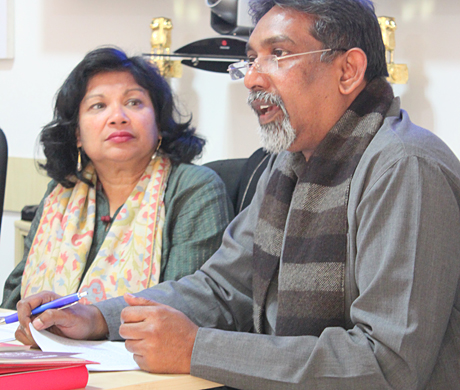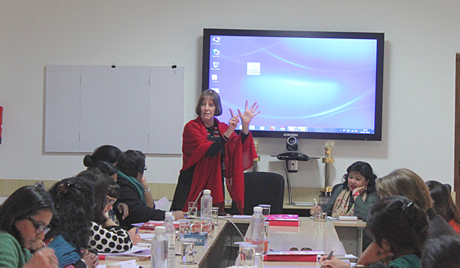What will development look like after the Millennium Development Goals?
Date:
NEW DELHI - UN Women in collaboration with Oxfam India and Wada Na Todo Abiyan hosted a brainstorming meeting to forge a clear gender perspective on development goals for the next decade. The suggestions from partners will guide and feed into recommendations currently being developed by UN Women for an inclusive post Millennium Development Goals framework that will be submitted to the United Nations Resident Coordinator by 28 February, 2013.
The development work of the UN, Governments and civil society around the world for the past 13 years has arguably been dominated by the Millennium Development Goals (MDGs). The MDGs were set to guide development from 2000 for 15 years. So the question arises, what direction will development take post 2015? And, importantly, how can we ensure that women’s rights are at the center of any post 2015 agenda?
In 2000, world leaders, nearly 200 UN member states and over 20 international organizations agreed to work towards achieving the MDGs by 2015. For the past 13 years, the MDGs have framed and guided development work around the world. As 2015 approaches, now is the time to evaluate the strengths and weaknesses of the MDGs, and to brainstorm how the ‘next generation’ of development should evolve.

Ms. Nisha Agarwal, CEO, Oxfam India and Mr. Paul Divakar of Wada Na Todo Abiyan speaking at the consultation. Photo Credit: UN Women/Sarthak Karol
The previous history of the MDGS, their limitations within the current national context, as well as thematic priorities and recommendations for the future, were discussed in the meeting attended by civil society organizations.
Ms. Anne F. Stenhammer, Representative UN Women stressed the need for sustainable development, the need for peace and security and inclusion – and the need to do it within a human rights framework. She said that women’s empowerment and gender equality were always seen as women’s issues and not as human rights issues.
Ms. NishaAgarwal, CEO, Oxfam India said that there had been considerable criticism of the old MDGs, which reflected a donor-donee world. The MDGs had too soft a focus on women’s rights and too high a focus on service delivery. She said that there is need to look at rights that are universal, inclusive and inter-dependent and that the next set of goals should be for all humankind. The rise in inequality needs to be focused upon, particularlypost-recession, and that women’s rights should be the central theme of the MDGs.
Mr. Paul Divakar of Wada Na Todo Abiyan said that there was a need to combine promises of political parties. Large global goals needed to be broken down to national, sub-national and community levels, so that the community can make MDGs work at a level that is appropriate for them. The MDGs, he said, had not addressed structural issues and that there was no mechanism to hold them accountable. There was no way to engage with movements at the grassroots level. Stressing the need for a human rights perspective, there needed to be a stronger demand for sustainability in issues and inequalities addressed.

Ms. Anne F. Stenhammer, Representative UN Women at the brainstorming meeting jointly organized by UN Women, Oxfam India and Wada Na Todo Abhiyan (WNTA). Photo Credit: UN Women/Sarthak Karol
The brainstorming session was a great opportunity for participants to discuss a variety of issues. Gender was the overarching them to a variety of topics including: the gap between research and ground realities; social and economic inequity and how to translate concerns into targets; issues of discrimination and exclusion;the need to look at power, the need for gender dis-aggregated data; rape and violence against women,inheritance and property rights, labour and migration; social security policies, investing in women’s leadership. Most agreed that the Beijing Platform for Action and CEDAW continue to be the cornerstone of women’s rightsand underpin the post 2015 agenda.
Key themes which emerged from the discourse focused on the gaps, both at the micro and the macro level of implementing the MDGs. Most agreed there is a need to situate the post-2015 agenda in a human rights framework. The agenda needs to target marginalized communities and the most vulnerable groups.
The participants also discussed the need for greater accountability and transparency and the criticality of putting gender back at the center stage of planning processes. Budgetary allocations based on rights issues was one example of how this may be achieved.
Within a global climate of rapidly shifting power and influence, consultations such as these are essential in informing and institutionalizing political tools, such as the MDGs. We need to ensure that the wide range of women’s voices influence any post 2015 development framework.